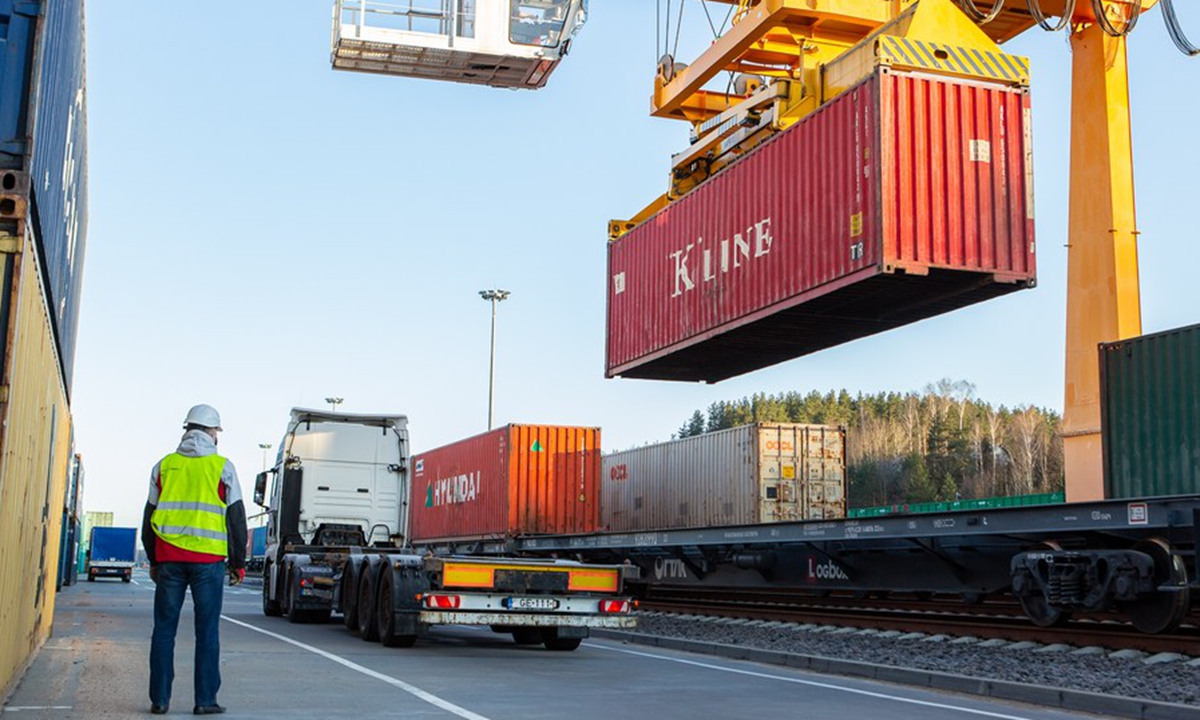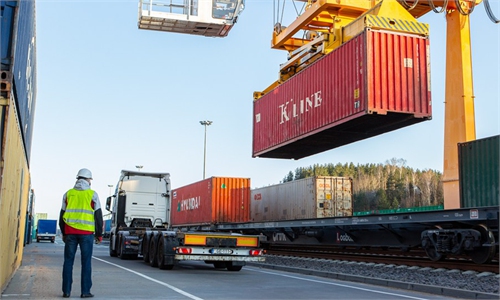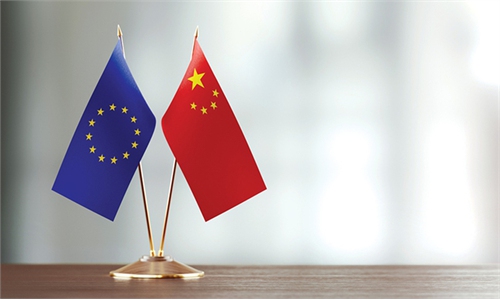GT Investigates: Lithuanian goods not yet removed from China’s customs list, but firms seek alternatives amid risks
But firms consider halting imports from Lithuania to fend off risks

The "China Post" CR Express 1st block train is unloading in Vilnius, Lithuania, April 14, 2020. Photo: Xinhua
Some Lithuanian and other foreign media outlets have reported that Lithuanian products have been removed from China's customs systems, with some painting the move as "economic coercion" by China, after China downgraded diplomatic ties with Lithuania over the latter's mistake on the Taiwan question.
However, a Global Times investigations into such claims, which included interviews with several sources close to Chinese customs and industry insiders, found that Lithuanian products are still listed in official customs systems as of Sunday, contrary to what some media reports suggested.
But in light of growing risks, Chinese traders and industry insiders are diversifying their import sources after reducing or halting trading with Lithuania to fend off potential risks posed by political tensions.
Chinese experts said that while there have been no direct economic countermeasures yet against Lithuania, future countermeasures cannot be ruled out if Lithuania continues on the wrong path. Chinese officials have also said that Lithuania would pay a price for its mistake of challenging China's sovereignty.
False claims
Lithuanian media outlets have reported claims from the country's politicians and business representatives, saying that China is suspending imports of some Lithuanian products amid deteriorating bilateral relations and that Lithuania has taken off the trading list with China.
Several sources, including those close to Chinese customs, denied such an allegation when reached by the Global Times on Sunday, saying that Lithuanian goods are still on the approved trading list.
But industry insiders said that they have already looked into alternative sources to diversify their supplies amid a growing tension from the Lithuanian side on trade.
Media reports said that Lithuanian businesses have recently been unable to clear their goods into China as the latter removed Lithuania from its custom systems as of December.
Vidmantas Janulevicius, president of the Lithuanian Confederation of Industrialists, told local media he knew of five companies facing such a problem, the South China Morning Post reported on Saturday.
However, after reaching several sources at customs and foreign trade businesses on Sunday, the Global Times learned a different story.
A source close to the customs agency told the Global Times on Sunday that Lithuania, number 336, is covered in the import allowance list at present. Technically, "that means imports from Lithuania could still move normally," said the source.
The source noted that she was not aware of any instruction to remove Lithuania from the list. "But if the declaration cannot be processed, there must be some policy adjustments," said the source.
Another source from an international trade enterprise told the Global Times on Sunday that enterprises that have licenses for international trade can access the list, and the source also saw Lithuania on the list.
Rokas Radvilavicius, managing director of the Lithuania-China Trade Association, told Baltic News Service that there's no official information in China of goods from Lithuania being blocked but such signals might be sent through "internal orders".
A senior trader in the timber business based in Shanghai told the Global Times on Friday that the company has noticed reports about Lithuanian timber being unable to get clearance on the Chinese border.
Averting risks
But she said that she had already explored other alternative sources from regional countries in Northern and Eastern Europe to fend off any potential risks of disruption.
"We have noticed a growing 'smell of gunpowder' from the Lithuanian government and industry representatives against Chinese businesses after their provocative move on the Taiwan question, and we just cannot afford any potential disruption from that," she said, noting that timber from other European countries can be substituted for Lithuanian sources.
Since 2015, trade between the two countries has grown rapidly, from $1.35 billion to $2.13 billion, an increase of more than 82 percent in five years, according to media reports.
Chinese Ambassador to Lithuania Shen Zhifei said in an interview with the Baltic Times in May that statistics and facts showed that the Chinese market was open to Lithuania and was constantly developing.
The recent allegations by foreign media reflected the fact that Lithuania is making excuses for itself and trying to gain bargaining chips, so that it can accuse China under the hyped claim of "diplomatic coercion and bullying," Cui Hongjian, director of the Department of European Studies at the China Institute of International Studies, told the Global Times on Sunday, responding to the reported trade ban mentioned by some foreign media and politicians.
"Although bilateral relations have been downgraded due to the mistake made by the Lithuanian side over the Taiwan question, that does not necessarily mean direct economic countermeasures from the Chinese government," Cui noted.
The soured bilateral relations will surely inflict damage to economic and trade cooperation, but it is important to differentiate the activities of the Chinese government and enterprises, Cui said.
Moreover, the expert noted that after a serious setback in bilateral relations, one cannot rule out countermeasures such as a trade ban being used as a future option.



